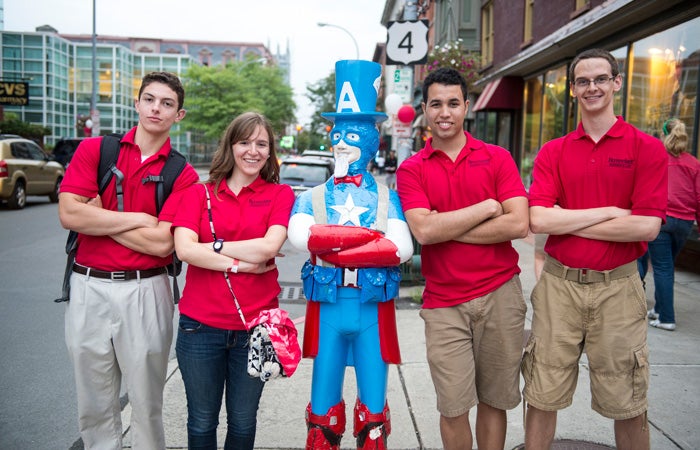 The economic impact of Rensselaer on the Capital Region was more than $1 billion in 2013, representing an increase of $300 million over the last eight years, according to a new study released Jan. 15.
The economic impact of Rensselaer on the Capital Region was more than $1 billion in 2013, representing an increase of $300 million over the last eight years, according to a new study released Jan. 15.
“Rensselaer plays an important role in the region’s economic vitality and our transformation into a world-class technological research university with global reach and global impact amplifies our positive impact on the community,” said President Shirley Ann Jackson. “We could not have done this without outstanding faculty and staff who act as stewards in the community and our students who are drawn to the Capital Region from 48 states and 57 countries. While our research is global, it also has a local impact. The Jefferson Project at Lake George, which seeks to understand and manage the complex factors impacting Lake George, is an illustration of how Rensselaer is using advanced tools and technologies to address complex global challenges while also helping to preserve one of our local treasures.”
Conducted by the Center for Governmental Research for the Commission on Independent Colleges and Universities (CICU), the study provides an insight into the contributions Rensselaer makes to the surrounding communities. With over 6,600 students and thousands of visitors annually, the Rensselaer student and visitor impact was estimated to be $61.3 million in 2013.
The downtown Troy business district sees the impact of students and their visitors on a regular basis. Students frequent the Saturday farmers’ market, and when parents are invited to the campus, we see a large increase in visitors to the downtown, and students also participate in our monthly arts event. One really just has to take a look around the city to see the impact of students on our local economy.”
Rensselaer has made a concerted effort to connect with Troy’s downtown. This has helped with the resurgence in Troy and, according to Erin Pihlaja, executive director of the Downtown Troy Business Improvement District, “The downtown Troy business district sees the impact of students and their visitors on a regular basis. Students frequent the Saturday farmers’ market, and when parents are invited to the campus, we see a large increase in visitors to the downtown, and students also participate in our monthly arts event. One really just has to take a look around the city to see the impact of students on our local economy.”
 In addition to the Institute’s direct employment of close to 2,000 employees, the report estimates that Rensselaer creates 3,100 indirect jobs and 410 technology indirect jobs from research spending. “The Institute’s employees are an integral part of the regional economy, paying over $28 million in local, state, and personal income taxes,” said Christopher Nolin, Rensselaer director of community and state relations.
In addition to the Institute’s direct employment of close to 2,000 employees, the report estimates that Rensselaer creates 3,100 indirect jobs and 410 technology indirect jobs from research spending. “The Institute’s employees are an integral part of the regional economy, paying over $28 million in local, state, and personal income taxes,” said Christopher Nolin, Rensselaer director of community and state relations.
Statewide, private colleges and universities contribute a combined $74.3 billion to the state’s economy. “New York state continues to depend on its higher education institutions to educate our next generation of leaders, as well as contribute to our future economic growth,” said CICU president Laura Anglin. “Playing the role of anchor tenants with communities around the state, the Independent Sector educates hundreds of thousands of students while also providing jobs and significant fiscal impact for the communities where they are located. Throughout the state, our campuses are significant contributors to both the economy and community.”


